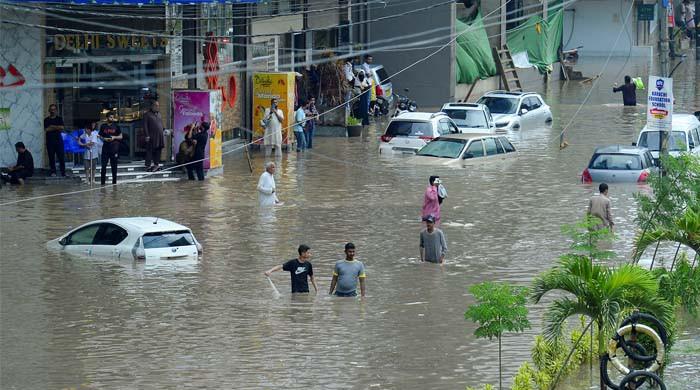August 19 began as a routine day for Karachiites — until the skies opened. By evening, the city of lights was submerged in darkness and despair: flooded roads, power outages, stranded citizens, and an overwhelming sense of chaos.
Karachi, a city often associated with energy and resilience, mirrored nothing but panic and fear that day. While roads have dried and life may seem “back to normal,” the mental scars remain.
For many citizens, the trauma of that night lingers on — raising a critical question: are we overlooking the silent impact of natural calamities on mental health?
A working woman’s nightmare
For Sahar Manzoor, a banker, the experience turned into a psychological ordeal.
“I was stuck with colleagues in the bank all night. Flooded roads forced us to stay inside, but as a woman, the thought of spending the night outside home was traumatic. I wasn’t scared of the rain itself, but of what society would think. That night will haunt me forever,” she told Geo Digital.
Students left vulnerable
Medical students Syeda Haya Batool Qazi and Kinza Javed were caught in their university transport for hours as rainwater filled the streets. The frustration was not just with the floods, but with the system’s negligence.
“Why didn’t they cancel classes?” Kinza asked in grief. “The rain was predicted. Instead of ensuring safety, students were told to leave in the evening. We are the future doctors of this country, yet our safety was compromised.”
Haya added: “Where were the authorities? One of our classmates was forced to walk home for six hours because we were drowning in the point. Is this a joke?”
A citizen’s fear for the future
For others, the trauma came with frightening flashbacks. Usman Faisal, who was stuck for four hours, recalled scenes of destruction around him.
“Cars were drowning, people were stranded, some were trying to push their bikes. For a moment, I remembered what happened in KP during floods. I thought — if it happens here, Karachi isn’t prepared. It felt like the last day of my life.”
Invisible impact: climate anxiety
Psychiatrist Dr Monica Vaswani explains that these experiences are not just “bad memories” — they are symptoms of a condition known as “climate anxiety”.
“Climate anxiety is triggered by disasters like floods, earthquakes, or heavy rains. Both those directly affected and those waiting helplessly at home for loved ones can suffer. Initially, people feel numb, fearful, or anxious. But without treatment, this can lead to Post-Traumatic Stress Disorder (PTSD).”
She warns that flashbacks, avoidance of affected places, hearing imagined cries or chaotic sounds, and persistent fear are red flags.
The Ministry of Planning, Development, and Special Initiatives said that out of every five flood survivors in Pakistan, one needs mental health support. The American Public Health Association, one of the oldest and most credible health bodies, also notes that climate disasters can affect minds suddenly, gradually, or even indirectly.
As Dr Vaswani puts it, the trauma isn’t always visible — “sometimes it comes quietly, in sleepless nights or constant anxiety long after the waters recede. In developed countries, therapy and counseling are part of the rescue process. Victims are offered psychological support immediately after physical rescue. Here, even physical rescue faces delays — mental health doesn’t even come into the picture,” she added.
Why it matters?
The Karachi rains of August 19 were not just a climate event — they became a mental health crisis. Survivors may never forget the fear, uncertainty, and helplessness they experienced.
As climate change worsens, such calamities are expected to become more frequent. Ignoring their mental toll only deepens the crisis. Awareness, timely psychological support, and government accountability are crucial if we are to protect not just lives, but the minds and futures of citizens.


